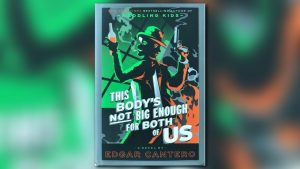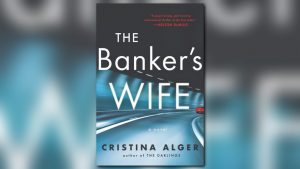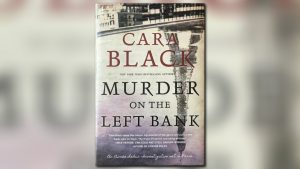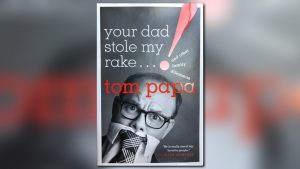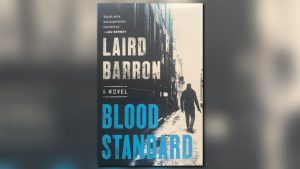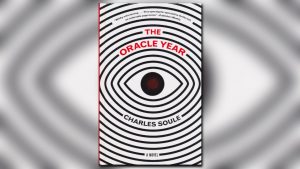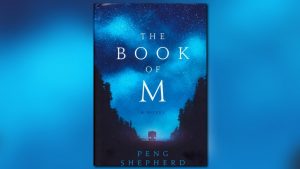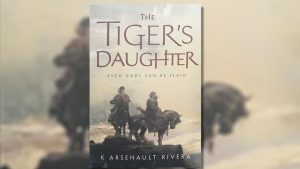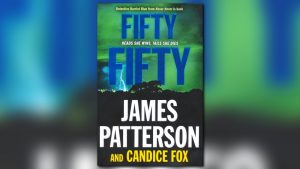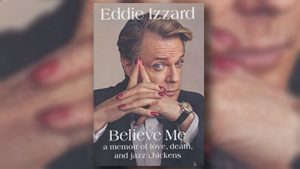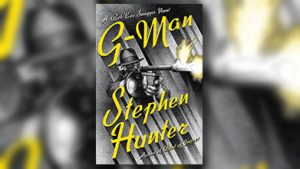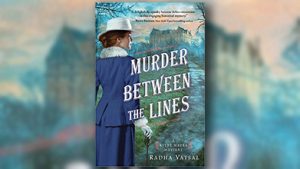Charlotte is a small-town girl at a writer’s workshop in Iowa where she meets the outgoing Esme.
The two become fast friends, but when Charlotte betrays Esme, their weekend friendship is destroyed.
Fast forward 20 years, Charlotte is living a quiet life as a successful writer with her husband.
Esme shows up at her doorstep and the two seem to be getting along until Esme gives Charlotte a “request” that causes Charlotte’s life to turn upside down.
VOICEOVER: And now, an Eight original production. "Books & Co." is made possible by the Department of English at Arizona State University. And by the Friends of Eight, Members of Eight, Arizona PBS who give additional gifts to support original programs. Thank you.
ALBERTO RIOS: Welcome to "Books & Co." Bienvenidos todos. I'm your host, Alberto Rios, and we're joined today by Elizabeth Evans, who will be talking about her latest book, "As Good As Dead.” Elizabeth, welcome.
ELIZABETH EVANS: Thank you.
ALBERTO RIOS: Welcome back I should say.
ELIZABETH EVANS: Thank you.
ALBERTO RIOS: This book, it's a new book, I don't know how you would describe it. We'll talk about that, maybe a psychological -- thriller? Why not? It is. It has the plot twists that I think bespeak what a thriller asks of us. But why don't we start with a little synopsis. Let's start with the beginning.
ELIZABETH EVANS: Okay. The book starts with the main character, narrator, Charlotte, and she’s in Tucson, it's 2008, and she's a writer and working at her desk, and someone's at the door, and she goes, and it's a woman she doesn't recognize. Someone rather stout, and plain, and yet when she opens the door it turns out to be a very dear old friend of 20 years back, and a woman who used to be quite gorgeous and charismatic, and she's a friend that Charlotte betrayed. And so Charlotte has a feeling, should I be happy, and will this be a chance for me to redeem what I did in the past? Or should I be concerned? Because this is someone I betrayed, who knows some secrets about me, and that's where we start off.
ALBERTO RIOS: And that betrayal is central to the book. And it has a variety of incarnations. Both when it happened and in that 20-year follow-up period. And we get a little bit of a glimpse of both. The book travels back and forth.
ELIZABETH EVANS: Yes. A lot. The two were friends in graduate school, at the University of Iowa, when they were in their 20s. And Charlotte's betrayal, which was a very stupid thing --
ALBERTO RIOS: We human beings.
ELIZABETH EVANS: Yeah, we human beings. There were consequences, you know. Beyond the betrayal. A number of things cascaded out of that betrayal. And in fact, in more ways than I think she entirely realizes those consequences have affected her life. She's 41 when the book opens, and that's an important part of the book. She has some secrets that have distorted her life.
ALBERTO RIOS: And it's interesting that there's a variety -- I think we can pick from the metaphors that might suggest that, including the oleanders outside the window – later they go through a change. We're seeing change on all fronts relative to her, to Charlotte. Let's start with place. You said she's in Tucson now, but it's not just Tucson. It is -- I can almost draw a map of it. It is very specifically Tucson and University of Arizona and even the Modern Languages Building. This is a teacher of Creative Writing, in a lot of ways, every writer will know every reference you're making here. But I would -- I wonder who you think the audience is who is going to do this? And what I'm really saying is, is that a lot like talking about family when you talk about place that's so specific?
ELIZABETH EVANS: I am really keen on setting. And in fact in the book Charlotte being a writer and teaching writing, she talks about setting, and the importance of setting, and how you have to feel like a table is solid, because nothing of consequence can happen if you aren't in a world where the tables are solid and glasses of water can fall over. So I had a good time doing the setting of Tucson, and the U of A, and also Iowa City where the girls went -- the women when they're young were students. And I also had fun, you talked about change. We see the oleanders, they were young and now they're great big. But there is a way in which there's this enduring beauty, natural beauty of Tucson, with the mountains and the desert, and the flora and fauna, and there's also the change that occurs there. It's 2008, there's been a housing boom, and bust, and now we're in the recession and lots of desert has been bladed, and ticky-tacky buildings have gone up, and so there's a change in that environment.
ALBERTO RIOS: Which is almost a description of what Charlotte is doing to herself. She's putting things -- an overlay. But so are the other characters. So it's not only Charlotte, but the book is from Charlotte's point of view. So that's how we're taking it all in, from Charlotte's point of view. You describe Tucson so well, it's the writer's advice, write what you know. You yourself are living in Tucson. Did you also go to Iowa?
ELIZABETH EVANS: I did, yes.
ALBERTO RIOS: So you have these environments that are very close to you.
ELIZABETH EVANS: Yes.
ALBERTO RIOS: And both of them reasonably spare, and I think that speaks to the character as well. Is that something you think about as you're writing, or is it just because that's where are you and that's what you're going to write?
ELIZABETH EVANS: I have to admit, I write very much from the seat of my pants.
ALBERTO RIOS: I'm glad to hear that.
ELIZABETH EVANS: So, you know, this story, just let me take you back a little bit. Many years ago an older friend of mine who -- she was probably about 50, I was maybe 20. And she had had this very strange experience. An old friend of hers had come to her after they had not seen each other for many years, and oh, what a nice surprise. My friend's come to see me. Well, it turns out this friend asks her a favor. And it was a pretty bad favor. So this was a distressing thing. And that situation that she described to me, and I was about 20, it just stayed with me and I would think about it. And I would cast it with different characters, one being relatively more powerful than the other, and so on. And a few years ago I was walking by my dresser and just scribbled down a couple lines about that idea. And I would do this off and on for, I don't know, a couple months. And then --
ALBERTO RIOS: It was growing and growing.
ELIZABETH EVANS: It was growing, but it was still on just this one little back of a bill or something. One day I couldn't find it. And I thought, oh, well, now I have to write this. And I was working on a novel at the time. But I sat down and I wrote this story.
ALBERTO RIOS: From that scene.
ELIZABETH EVANS: Yeah. And it ended up being a very long short story, which was actually published. And then I showed it to my editor at Bloomsbury , Nancy Miller, and she said I love this story. But I think it needs to be a novel. And in working on it, I kept throwing things out. Kept throw things out. I was determined to go back to this other novel. So it had to be a story --
ALBERTO RIOS: Throwing things out when you needed to write a novel, that's --
ELIZABETH EVANS: Well, I had a novel already going. So I sat down and I did this novel. But like I said, you know, it's the seat of the pants thing. I would write so much more than I use. I was fueled by female friendships, betrayal, but when I start, I have -- I just know I want to make something. Make something out of words. And there's some strong feeling that I want to get at. But this story, it had a lot of surprises for me along the way.
ALBERTO RIOS: A lot of surprises for the reader as well. And I think that part was exciting. Exciting is curious word choice. They were striking. And reading the book, those surprises I think become very important element of the story. It's not that Charlotte is a narrator we can't trust. We can trust her, but she is so trusting that we're in her camp and so anything that is a surprise to her is true I think maybe a double surprise to us because she doesn't see it coming, therefore we don't. And I think that's an important part of how you're writing this.
ELIZABETH EVANS: And I like these characters that, you know, I think she's a fairly decent character, but you know, but she's flawed, and --
ALBERTO RIOS: She might argue with you, right? I think you're right, but I can see her insecurity coming to the fore all the time.
ELIZABETH EVANS: Yeah. She tells us right at the beginning of the story, “I betrayed my friend,” and then she tells us basically what she did. It's not like the story is holding back on what the nature of that betrayal was. And she's -- she does this thing that it's like she's trying to strike out in this betrayal. But it's not in her best interest, you know. It's just not in her best interest. I guess I identified with that kind of goofy thing, especially with younger people. But I guess we can do it as we're older too.
ALBERTO RIOS: I think we can. I'd like to take a moment to remind our viewers that you're watching "Books & Co.," I'm your host Alberto Rios, and we're joined today by Elizabeth Evans, talking about her latest novel, "As Good As Dead." Let's talk about that title for just a moment. That's a phrase that occurs to Charlotte, and it's relative to this person that she really does love. It's this friend from Iowa, well I use "friend" loosely. There are all sorts of complications, as there are in friendships, but this phrase comes out of the blue to her. Can you talk a little bit about that?
ELIZABETH EVANS: Yeah. She is looking at an old photograph of herself and her friend Esmé from when they were back at Iowa together. And she looks at it and she thinks, I'm as good as dead to that person. And it's this horrible kind of moment for her, because there's a sense that, well, I did this bad thing, I'll never be able to do -- I'll never be able to make it right, because she's cut me out of her life entirely. But then there's another -- there's a turn, because she thinks, well, if I am as good as dead to my friend, then she's not going to come back to haunt me. So maybe --
ALBERTO RIOS: The good side of that.
ELIZABETH EVANS: Yeah, maybe I should just accept this. And then what happens of course is that she turns up.
ALBERTO RIOS: It's a little bit of a prompting of the -- a pricking of the universe to make something happen. You use -- when she's looking at the photographs, she also comes across a trove of stories that the other workshop participants had all submitted and they had read, and she reads one of her own that turns out to be about two thinly veiled other characters, but it's really herself and this friend. So you have a very interesting technique that you use there that's almost -- I don't know what we'd call it, it's kind of the opposite of meta-fiction, it's not the reader getting -- it's the main character getting insight into herself, her characters, and she becomes a character. And so from a writer's perspective, you're doing an very interesting thing there. And you write that story. We get to see a good part of it. Tell me about how that came to you.
ELIZABETH EVANS: Well, part of that was the original story that I had worked on. And the original story, the people were students at University -- they were at the University of Minnesota, and they were painters. So it was that kind of veiling. And she has the experience as she's reading her fiction of finding that she actually used Esmé's name in the story in one spot. Instead of the fictional character's name, she thought oh, my god, what if this – I’d somehow publish this in her name had been in it, and, you know, her game would have been up.
ALBERTO RIOS: And we go by that a little bit, but it is probable that she turned it into the workshop.
ELIZABETH EVANS: I think it's supposed to be after -- a bit after. She's trying to understand that friendship, you know. She did for years, just trying to understand -- and I find friendships so interesting. Female friendships in particular, because they seem to be so intense. I think female friendships involve all this trust, and self-disclosure, and being silly, and Charlotte, she loves her husband very much, but she doesn't like tsinging old Broadway musicals with him. There are things she can do with Esmé. She discloses too much, and that's where she's a bit too trusting. They come from very different situations.
ALBERTO RIOS: And yet she herself thinks she's been the one who's perpetrate the betrayal.
ELIZABETH EVANS: Yeah.
ALBERTO RIOS: So we can argue where the betrayal is and what constitutes betrayal in this particular story. But I think it's pretty interesting. That character Esmé, who is the live wire of the novel, she seems to inhabit the thing that the main character wants to be. You have this great line when you first describe her, “that Esmé Cole had been stylish and slim in retro-capris, vintage cashmere cardigans, a lovely 25-year-old with a bushel basket of red hair pinned up in a cloud of glorious dishevelment. Brave, I'd thought, wearing your hair that way. Like keeping a swan for a pet, and walking the thing around town, an announcement that you knew you were fabulous.” Of course you wanted to be friends with her, right? And that haunts, and I mean almost literally haunts the whole novel.
ELIZABETH EVANS: Yeah.
ALBERTO RIOS: Of course she sees that as the right way to go.
ELIZABETH EVANS: The first -- they've hardly met, and Esmé asks her, oh, come -- move into -- be my roommate. And here's this Charlotte, she's from a small town, blue collar background, shy, oh, my gosh! Wow. This person wants to be friends with me.
ALBERTO RIOS: Immediate acceptable – open arms. Who could say no. And she is -- Oh, we won't say mistreated by that feeling, but she is genuine in her receptivity, and I think we'll let it be with that. Let's speak for just a moment about her actual family, Charlotte's actual family. Plays a counterpart role to Esmé, but not exactly. Maybe you could talk about what you were trying to do with the family when they came to visit. They were understanding and not understanding, supportive and not -- they didn't know what to do with her – with Charlotte!
ELIZABETH EVANS: Right. Yeah. Well.
ALBERTO RIOS: Even the dad likes Esmé!
ELIZABETH EVANS: Yeah, oh, I'd like to take her out on a date!
ALBERTO RIOS: Exactly.
ELIZABETH EVANS: Yeah. Well, the dad is a brakeman for the railroad, the mom is an egg sorter at the hatchery in their little town. They come from a completely different world, Esmé comes from money and she's gone to school in the East, and she has this whole different world. And the parents come, the parents, sweet parents, they bring a loaf of bread and a thing of margarine, because they think --
ALBERTO RIOS: As you say – a pound of butter.
ELIZABETH EVANS: Like we're bringing a little offering to our daughter, because it's nice to have toast wherever you go. And Esmé is like, you know, this is Ma and Pa Kettle or something, who have arrived. But she's nice to them. She has good manners and so on. But Charlotte's parents have no understanding of this daughter who wants to be a writer, and --
ALBERTO RIOS: No understanding, but they're so genuine themselves. That's a tough one. You go on to later write I would say a memorable dinner party scene, where Charlotte and Esmé and their significant others finally decide they're going to have dinner together, and this is a turning point in the book. And it's like, “Who's Afraid of Virginia Woolf” almost, it's a very difficult scene to read, but delicious on its own terms, right? Tell me about writing that.
ELIZABETH EVANS: That was fun. That was a lot of fun. And you know, I shouldn't say just fun, because there are times when --
ALBERTO RIOS: So awkward!
ELIZABETH EVANS: When you're writing and it is like, okay, there's a loose wire, and there's water on the floor or something. Am I going to get electrocuted if I go into that place? But yeah, you have four strong characters there, and everybody has his or her own point to make. And Charlotte's trying to be sort of polite, and so her husband won't be too uneasy with the situation. But oh, it's -
ALBERTO RIOS: Difficult.
ELIZABETH EVANS: Yeah, difficult.
ALBERTO RIOS: There were other difficult things too. You have a run of things that are going to be familiar, I mentioned this earlier, to writers, you mentioned AWP Associated Writing Programs Conference, and “Poets and Writers,” the publication, but you also mention David Foster Wallace. And you almost bring him in as a small character for a little amount of time. What did you think about doing that? How do you feel about that?
ELIZABETH EVANS: I brought David in at a moment in the story when -- well, there's going to be a celebration of his life, because he was a graduate of that program. And for me, at that moment what happens is he's been a friend of Charlotte's, and she's thinking here's this friend, he's died, brilliant, brilliant guy. And then she thinks of her husband who is just learned some things. And so she thinks, oh, I need to be concerned about my husband, you know. Would he do something impetuous and harm himself?
ALBERTO RIOS: A very interesting weight for her to turn, to think of it that way. That was hard. Because we know -- we care about people and a lot of people knew David, but to start thinking of that life as a model for something, positive and negative, and what to start looking for was an interesting moment, I think, in the book. You talk a little bit also about the vagueries of the administrative structure of things. And you've got an assistant who maybe isn't doing 100% of the job, and this person -- those are just the vagueries of teaching at a university. Was there more to that, or do you think that was just --
ELIZABETH EVANS: I think --
ALBERTO RIOS: Were you having fun with that too?
ELIZABETH EVANS: I think people are interested in specific occupation of a character. I was with Stanley Elkin at Breadloaf once, and he was teaching a class, and he would always get into occupation. That's how a person is spending their life. That's how they're spending their time. And so it's fine to give some of the particulars, but -- about what the teacher has to do and so on. But I think when you get at the particulars and you have people responding, interacting, it tends to universalize and everyone can recognize, you know, you might have a job at a dairy, but you probably know some things that are very similar.
ALBERTO RIOS: This is how things really work.
ELIZABETH EVANS: M-hmm.
ALBERTO RIOS: Let me finish by saying there's also some tenderness in here, and for all that Charlotte is going through and all of the breadth of the story, there's one moment where she talks about meeting Will, whose name itself might be a metaphor, when she meets him after all of the description of meeting him, you have this simple line, "Well, I was a goner. A quaint version of my former self." A wonderful moment.
ELIZABETH EVANS: Thank you.
ALBERTO RIOS: Thank you for joining us here today.
ELIZABETH EVANS: Thank you.
ALBERTO RIOS: I want to thank our viewers for joining us as well. You've been watching "Books & Co." I'm your host, Alberto Rios. We've been joined today by Elizabeth Evans, talking about her latest novel, "As Good As Dead." Please join us again next time when we'll be bringing you another good book. Elizabeth, thank you.
VOICEOVER: "Books & Co." is made possible by the Department of English at Arizona State University. And by the Friends of Eight. Members of Eight. Arizona PBS, who give additional gifts to support original programs. Thank you.








